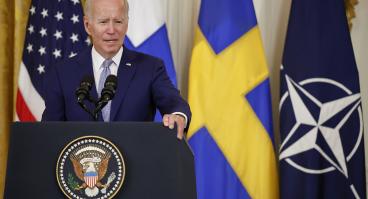Conference Report: Israel at 75

Table of Contents
Share this Publication
- Print This Publication
- Cite This Publication Copy Citation
"Conference Report: Israel at 75" (Houston: Rice University’s Baker Institute for Public Policy, June 1, 2023), https://doi.org/10.25613/8dva-vx78.
On May 14, 1948, the Jewish People’s Council approved a proclamation establishing the new state of Israel — making May 14, 2023, the 75th anniversary of Israel’s founding as a state among the nations of the world. To reflect on the binational relationship between the United States and Israel, the Baker Institute for Public Policy hosted Israel at 75 on April 27, 2023.
Diplomats, subject-matter experts, policymakers, and community stakeholders gathered in Baker Hall to address the role of the United States in Middle East foreign policy and explore the challenges and opportunities Israel faces internally and abroad.
This conference report summarizes three discussions from Israel at 75 that explored the future of the U.S.-Israeli partnership, the viability of a two-state solution, and Israel’s government and the political direction of Israel.
Overview
Secretary James A. Baker, III, the institute’s honorary chair, opened the conference by introducing the extraordinary collection of government officials and practitioners in attendance. In his remarks, Baker explored the shared interests and common values between the U.S. and Israel. Notably he discussed concepts of security, intelligence, diplomacy, technical innovation, and economics. Baker commented on the Israeli-Palestinian conflict stating that practical alternatives to a two-state solution “will neither guarantee to Israelis the security they deserve nor deliver to Palestinians the state that they desire.”
Following Secretary Baker’s address, Israeli President Isaac Herzog delivered welcome remarks and described the future of democracy in Israel. Herzog reinforced the need to find “common ground between the different voices in [the] nation” and to engage in “dialogue that is open, respectful, and constructive.”
Echoing the president’s sentiments, Thomas Nides, the U.S. ambassador to Israel, shared his support for a genuine compromise to ensure that both Israelis and Palestinians enjoy equal measures of security, prosperity, and freedom.
Panel I — Israel and the U.S.-Israel Relationship at 75: A Retrospective and the Road Ahead
Moderated by Aaron David Miller, senior fellow at the Carnegie Endowment for International Peace, the first panel offered reflections and assessments on the past quarter century of American diplomacy in Israel. Drawing from their experiences, three former U.S. ambassadors to Israel — Edward P. Djerejian (1993-1994), Daniel C. Kurtzer (2001-2005), and Daniel Shapiro (2011-2017) — characterized the United States’ moral and strategic interests with respect to the state of Israel and highlighted that the United States’ priorities have remained consistent under each presidential administration. Five critical issues emerged: Iran, peace within Israel and across the region, Israel’s internal and military security, and lastly, intelligence cooperation.
In evaluating Israel’s internal challenges in the immediate future, the ambassadors considered how the recent Israeli judicial reforms could change the nation’s relationship with the United States. There was a general consensus among the panelists that the proposed judicial reforms are unlikely to be adopted given the magnitude of public protests. However, if the legislation were to pass and become law, the ambassadors agreed it would significantly alter the balance between the three governing branches within the state by limiting the judicial branch’s checks and balances. The most likely prospect over the next several months was freezing progress on the judicial reforms and a Netanyahu strategy of “playing for time” by offering concessions/inducements to his coalition partners to hold the government together until a more promising moment for moving forward on the reforms was possible. There was agreement that the prime motivation for Netanyahu was not passing judicial reforms; it was providing a resolution of the cases against him in the courts.
The panel concluded with an examination of the role of U.S. diplomacy in the Israeli-Palestinian conflict and the evolution of value propositions under U.S. presidential administrations. The ambassadors discussed the dangers of a one-state solution and argued that a two-state solution is the only viable arrangement. With the lack of resolution on how to proceed, however, they noted that it will be difficult to achieve this outcome.
Panel II — Two States for Two People? Are There Still Viable Solutions for Israel and Palestine?
At the second panel of the conference, Baker Institute Director David M. Satterfield was joined by Salam Faayad, former prime minister of the Palestinian Authority; Barbara Leaf, U.S. assistant secretary of state for Near Eastern affairs; and Gilead Sher, former chief of staff and policy coordinator to Israeli Prime Minister Ehud Barak and a senior peace negotiator. Throughout this session, the panelists examined the challenges of a two-state solution and explored possible alternatives.
The panelists agreed that a one-state solution is not the desired outcome for Israelis or Palestinians. When asked what direction the United States and the Arabic world could take now, Assistant Secretary Leaf acknowledged that a “dangerous trend line for one state” exists, but she “does not see an alternative to two states.” Leaf added, “nothing [is] fixed [or] permanent about the prospects for or against a Palestinian state emerging.”
Satterfield described how years of managing Israeli-Arab and Israeli-Palestinian relationships has resulted in “a simmering sense of isolation, ostracization, and a ‘particularist’ or preferential democracy” in Israel. The negative effects on the daily lives of the inhabitants in these communities bore consequences that could not be anticipated by policymakers. Satterfield asked former Prime Minister Faayad to reflect and assess on what opportunities, if any, are still feasible.
Fayyad presented two critical points where movement on the issue could occur. First, in order to go beyond the management phase, the two-state solution must be clarified because “different people have ... different concepts as to what that might mean.” Second, Fayaad said that it is crucial for Israel to formally recognize the Palestinian Authority’s “national rights as provided for under international law.”
Even though a one-state solution is not viable nor favorable, economic and administrative resolutions have been absent or have been present only in rhetoric from the international community and from the United States, said Satterfield. This creates a “sense of drift and void.” Turning to Gilead Sher, Satterfield asked if the status quo will remain the same or if change is possible — and if so, at what point in time would it look different?
Sher said that at present, the political will does not exist for an agreement based on the “two-states-for-two-peoples” principle. He outlined the challenges and explained how no common political horizon exists. As attitudes and narratives harden, and as radical extremists (in respective societies) continue to set the agenda, moving forward becomes nearly impossible. Yet, if the world does nothing, the incremental annexation of the West Bank will shortly become de jure, said Sher. Divisive issues like Jerusalem and the Holy Sites, territory, borders, settlements, security arrangements, and refugees will remain problematic.
For change to occur, the bar of expectations should be lowered, and the conditions for an eventual two-state solution should be preserved, recommended Sher. This outcome can be achieved through a series of transitional, interim, and independent constructive steps. He stressed the importance of a step-by-step process and described how “a border between two national entities — even a provisional one — is the lodestar.” He argued that only a “two-states-for-two-peoples” reality will secure a Jewish-democratic Israel and, simultaneously, political self-determination for Palestinians. To strengthen and incentivize collaboration and cooperation, regional talks (using the Arab Peace Initiative as a general guide) must continue, existing agreements (like the 2020 Abraham Accords) should be expanded, incremental change toward delineating the border between two distinct national entities should proceed, and actionable steps to address economic, security, and other cross-border issues must be taken. These steps, along with investing in “mindset-carving,” will help policymakers to regain control of the future.
Israel’s Government and the Political Direction of Israel
In a fireside chat, Ehud Barak, former prime minister of Israel, joined Baker Institute Director David Satterfield to discuss the composition of Israel’s government, the nation’s system of governance, and the political, social, and economic conditions influencing the direction of the state. The country’s high population, climbing GDP, strong currency, and rapid technological and military advancements have made Israel “the most successful national project of the 20th century,” said Barak. Among those successes, he cited the peace agreements with neighboring Arab states Egypt and Jordan as major political achievements.
Despite these advancements, many challenges still exist within and beyond Israel's borders. Barak elaborated on key issues facing the nation and described how deep religious divisions among the population, opportunity gaps for Israeli youth, and conflict with Palestinians and Iran’s proxies — Hezbollah and Hamas — prevent Israel from achieving internal and regional peace.
After examining the challenges and opportunities facing Israel, the discussion shifted to explore the consequences of the proposed judicial reforms. After 75 years, all institutions need to be reformed, said Barak. The judicial branch is autonomous and acts independently of other branches of government, but the state of Israel lacks a constitution that outlines a system of checks and balances. This institutional structure effectively “enslaves the legislative branch” to the executive, noted Barak. With respect to Prime Minister Benjamin Netanyahu’s motivations, Barak described his efforts as “an attempt to crush the independence of the Supreme Court and push Israel out of the family of democratic nations.” Without the protests, Barak stated, “the Supreme Court would end up being evaporated the same way that it happened in Hungary.”
Satterfield inquired about the vigor behind the public protests and asked if the force and the continuity is about more than just the threat of the consequences of these judicial changes. The protests are motivated by the preservation of democracy, said Barak. Israel cannot begin to address secular religious burdens, the sharing of the settlements, and other major socio-political issues without a democratic system of governance. Barak agreed with the earlier comments by former U.S. ambassadors that progress on the judicial reforms would be halted while Netanyahu sought to buy time and keep his coalition together. While success in the short term was possible, over a longer period, inherent challenges within the coalition would threaten the prime minister’s strategy. Barak agreed that Netanyahu’s primary motivation was resolution of his legal cases and looked to a future point in which “the old Likud” party could reestablish itself in a post-Netanyahu political environment.
To conclude the discussion, Satterfield questioned whether there is a “political horizon” in the absence of a resolution and if it is possible for Israel to be a Jewish and democratic state in the future. In response, Barak explained that Israel has a “compelling imperative to find a two-state solution” for justice for the Palestinians and because of Israel’s “own interest, our own future, our own security, and our own ... faith.” In order to recognize Palestine as a legitimate state, he believes the Israeli government should clearly state its vision for a two-state solution and announce that Israel is “ready to delineate a line within the holy land, which will have Jewish majority for generations to come.” He also recommended reserving 80%-85% of the settlements in Juda, Somalia, for an independent, viable, and demilitarized Palestinian state.
To view video recordings of each session, visit the Israel at 75 event page.
This material may be quoted or reproduced without prior permission, provided appropriate credit is given to the author and Rice University’s Baker Institute for Public Policy. The views expressed herein are those of the individual author(s), and do not necessarily represent the views of Rice University’s Baker Institute for Public Policy.


